President Isaias Afwerki's Son Marries Longtime Girlfriend
Feb. 18, 2012 (ASMARA) — Abraham Isaias, the son of Eritrean President Isaias Afwerki (PIA), got married earlier this month with his longtime girlfriend.
The small wedding ceremony was held in Asmara on the weekend of February 3rd and 4th and was attended by Abraham's immediate family, friends and distinguished guests.
After completing his national service requirements, the 28-year-old Abraham finished aeronautical Engineering in Mai-Nefhi. His younger sister, Elsa, completed her national service duties in Sawa and currently works for ERI-TV.
The Afwerki Family
No online image is currently available of Abraham or his recent wedding. The president's family does not participate in politics and are seen in a favorable light for their modest lifestyles and contributions.
It is widely known the first lady, Saba Haile, takes public transportation to and from work and spends much of her free time assisting local charities.
Eritrean Naming Process
Eritrean traditions stipulates the wife keeps her last name, while their children must adopt the husband's first name as their surname.
The Afwerki Family
| Name | Relation | Age |
|---|---|---|
| Isaias Afwerki | Father | 66 |
| Saba Haile | Mother | 59 |
| Abraham Isaias | Son | 28 |
| Elsa Isaias | Daughter | 19 |
| Berhane Isaias | Son | Unknown |
*Note: this page was edited on March 20th - corrected name of PIA's daughter and the incorrect information of Abraham attending his university studies abroad. As more info of the wedding comes out, this page will be updated. If you have information to add to this story or have photos of the wedding ceremony, please contact the editor: MadoteEritrea@gmail.com
The following photos are of the Afwerki family
 |
| Saba Haile receiving an award in U.A.E. |
 |
| 19-year-old Elsa Isaias with her father at Sawa Festival |





























































